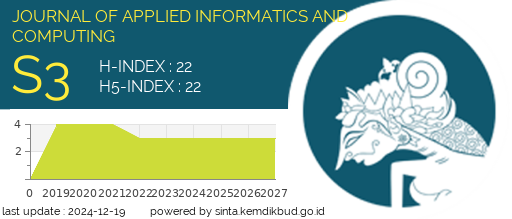Web-Based Mapping of Crime-Prone Areas in Samarinda Seberang and Loa Janan Ilir Districts, Samarinda Citys
DOI:
https://doi.org/10.30871/jaic.v8i1.5151Keywords:
Geographic Information System (GIS), Crime-prone areas, Samarinda Seberang, Theft data, Scoring techniqueAbstract
The development of Geographic Information System (GIS) technology has provided significant benefits in various fields, including the monitoring of crime-prone areas. GIS is used to minimize the traces of these crimes. This study aims to map crime-prone areas in the Samarinda Seberang and Loa Janan Ilir Districts to identify which areas are potentially vulnerable, allowing for analysis for prevention and handling. The data used were collected from theft cases that occurred in these districts in 2019 and 2020. The research employs a scoring technique where each parameter is rated according to its classification. The results of the scoring process are then analyzed to determine the level of crime-prone areas, categorizing them as very vulnerable, vulnerable, or not vulnerable. Based on respondents' feedback, the application facilitates users in locating crime-prone areas, with 94.34% of responses indicating agreement or strong agreement. These results suggest that the application is feasible for implementation.
Downloads
References
Dinas Komunikasi dan Informatika Kota Samarinda, "Kondisi Geografis," Pemerintah Kota Smarinda, 2017.
Mitha Ayu Tamara and Andri Kurniawan, "Pola Spasial Kejadian Kejahatan Jalanan (Street Crime) Berdasarkan Faktor Ekologi Kriminal di Kota Samarinda," Jurnal Bumi Indonesia, 2018.
A. Tatumpe, "Penegakan Hukum dalam Penanganan Tindak Pidana Ringan (TIPIRING) di Indonesia," Scientia De Lex, vol. 7, no. 2, 2019.
Syafei Karim and Bahrul Muhid, "Sistem Informasi Geografis Pengelolaan Daerah Aliran Sungai (DAS) di Provinsi Kalimantan Timur Berbasis Website," in Prosiding Seminar Nasional Teknologi V, 2019, pp. 51"“59.
S. H. Zamri and N. M. Abdullah, "An Overview of GIS Used in Oil Palm Plantation MALAYSIA *Corresponding Author Designation," Recent Trends in Civil Engineering and Built Environment, vol. 3, no. 1, pp. 1231"“1236, 2022, doi: 10.30880/rtcebe.2022.03.01.140.
Gilang Yudistira Hilman, Bandi Sasmito, and Arwan Putra Wijaya, "Pemetaan Daerah Rawan Kriminalitas di Wilayah Hukum Poltabes Semarang Tahun 2013 dengan Menggunakan Metode Clustering," Jurnal Geodesi Undip, vol. 4, no. 1, pp. 32"“42, 2015.
Indah Fitri Astuti, Ekky Fardinan, and Addy Suyatno, "Pemetaan Sosial Sebaran Kriminalitas di Kota Samarinda Berbasis Exponential Smoothing dan Sistem Informasi Geografis," Sebatik, vol. 19, no. 1, 2018.
Sisilia Aveati Septiandari, "Sistem Informasi Geografis daerah Rawan Kriminalitas di Kota Pontianak Berbasis Web," Jurnal Sistem dan Teknologi Informasi, vol. 3, no. 1, 2015.
Sarah Jeihan I P, "Analisa Daerah Rawan Banjir di Kabupaten Sampang menggunakan Sistem Informasi Geografis dengan Metode Data Multi Temporal," Institut Teknologi Sepuluh Nopember, Surabaya, 2017.
Resta Cahyani Putri and Bowo Susilo, "Pola Spasiotemporal Pencurian Kendaraan Bermotor (CURANMOR) Di Daerah Istimewa Yogyakarta Tahun 2018," Universitas Gadjah Mada, Yogyakarta, 2019.
D. E. Kurniawan and A. Fatulloh, "Clustering of Social Conditions in Batam, Indonesia Using K-Means Algorithm and Geographic Information System," International Journal of Earth Sciences and Engineering (IJEE), vol. 10, no. 5, pp. 1076"“1080, 2017.
A. Ariyanto, D. Kurniawan, and A. Fatulloh, "Rancang Bangun Aplikasi WebGIS untuk Pemetaan Kondisi Sosial Ekonomi Kota Batam", JAIC, vol. 2, no. 1, pp. 27-30, Jan. 2019.
M. V. Shenoy, S. Sridhar, G. Salaka, A. Gupta and R. Gupta, "A Holistic Framework for Crime Prevention, Response, and Analysis With Emphasis on Women Safety Using Technology and Societal Participation," in IEEE Access, vol. 9, pp. 66188-66207, 2021, doi: 10.1109/ACCESS.2021.3076016.
M. A. Kaif, S. Samaiya, R. A. Purnima, T. Sivasankar, A. Roy and A. Poojitha, "Development of an interactive web-based geovisual analytics platform for analysing crime data," 2023 IEEE Symposium on Wireless Technology & Applications (ISWTA), Kuala Lumpur, Malaysia, 2023, pp. 158-162, doi: 10.1109/ISWTA58588.2023.10249483.
P. TSAGKIS and Y. PHOTIS, "Perceived safety and fear of crime: A web-based GIS platform", EJG, vol. 12, no. 1, Jun. 2021.
Downloads
Published
How to Cite
Issue
Section
License
Copyright (c) 2024 Syafei Karim, F.V. Astrolabe Sian Prasetya, Anisa Sundarti

This work is licensed under a Creative Commons Attribution-ShareAlike 4.0 International License.
Authors who publish with this journal agree to the following terms:
- Authors retain copyright and grant the journal right of first publication with the work simultaneously licensed under a Creative Commons Attribution License (Attribution-ShareAlike 4.0 International (CC BY-SA 4.0) ) that allows others to share the work with an acknowledgement of the work's authorship and initial publication in this journal.
- Authors are able to enter into separate, additional contractual arrangements for the non-exclusive distribution of the journal's published version of the work (e.g., post it to an institutional repository or publish it in a book), with an acknowledgement of its initial publication in this journal.
- Authors are permitted and encouraged to post their work online (e.g., in institutional repositories or on their website) prior to and during the submission process, as it can lead to productive exchanges, as well as earlier and greater citation of published work (See The Effect of Open Access).











